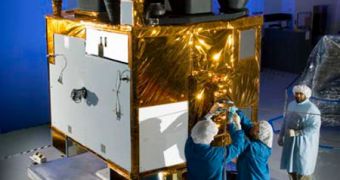The Cape Canaveral Air Force Station (CCAFS) was yesterday night the scene of an important rocket launch. The United States Air Force (USAF) managed to hurl into space its newest Global Positioning System (GPS) satellite, which is the first of a new series of advanced devices, planned to improve the service considerable. The spacecraft is called GPS 2F-1, and it blasted off at around 11 pm EDT (0300 GMT Friday). The Delta 4 delivery system scheduled to take it to orbit was unable to take-off during the last week, after having suffered delays and technical difficulties. The weather around the CCAFS was also not very cooperative, but last night all conditions were met for a perfect launch, Space reports.
The new constellation will be made up of 12 satellites, and it's destined to provide state-of-the-art, all-day navigation services to both military and civilian clients. The satellites will provide even more accurate data than GPS currently does. Granted, the existing system is rather limited for civilian clients, whereas the military gets ultra-precise localization services. “These next-generation satellites provide improved accuracy through advanced atomic clocks; a more jam-resistant military signal and a longer design life than earlier GPS satellites; and a new civil signal that benefits aviation safety and search-and-rescue efforts,” explains Boeing Space and Intelligence Systems vice president and general manager Craig Cooning.
“GPS is used by nearly a billion people worldwide for everything from farming and aviation to public safety, disaster relief and recreation, not to mention its military purpose of providing precision navigation and timing to combat forces. GPS 2F will increase the signal power, precision and capacity of the system, and form the core of the GPS constellation for years to come,” says Col. David Madden, the Commander of the GPS Wing at the USAF. He adds that last night's launch also marked an important moment in the Delta 4 program, whose first booster was launched on May 13, 1960. This month marks the program's 50th anniversary.
With the launch of new GPS satellite, the CCAFS will be able to clear its range and tracking stations in anticipation of the June 2/3 planned launch of the private Falcon 9 rocket. Developed by Hawthorne, California-based Space Exploration Technologies Corporation Inc (SpaceX), the delivery system has suffered countless delays over the past few months. It is being launched under a NASA contract, which states that the company will need to fly no less than 12 unmanned resupply missions to the International Space Station (ISS) over the next half-decade.

 14 DAY TRIAL //
14 DAY TRIAL //